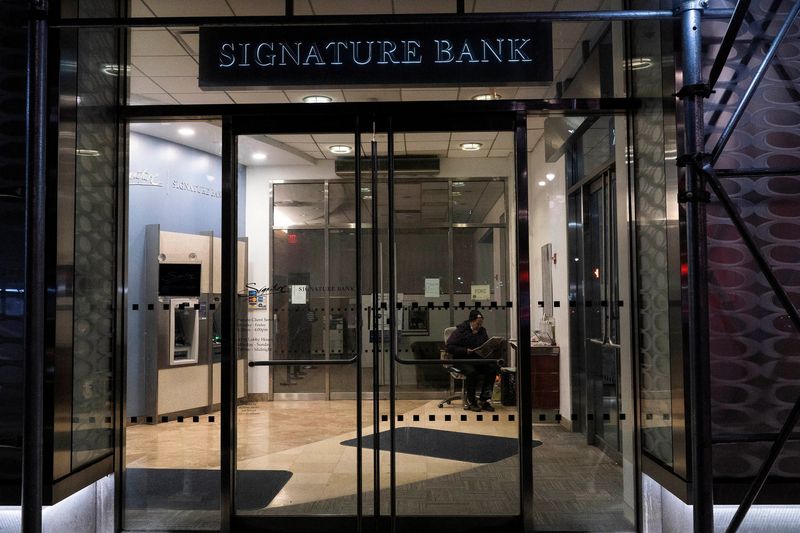A look at the day ahead in U.S. and global markets from Mike Dolan
U.S. regulators' swift weekend action to limit fallout from the failure of Silicon Valley Bank has prompted one of the most extraordinary recoils in borrowing costs in decades as investors re-assess the implications of the sudden banking system stress.
With New York-based Signature Bank (NASDAQ:SBNY) also shut down over the weekend, marking both as the second and third biggest bank failures in U.S. history, banking stocks round the world were hit hard - with questions mounting about the effect on business confidence and the next direction of monetary policy.
With shares in embattled Swiss lender Credit Suisse losing as much as 12% on Monday in the slipstream of U.S. events, bank stocks in the euro zone and Japan fell more than 5%.
And the extent of the policy rethink means that futures markets now think there's less than a 50% chance Federal Reserve will raise interest rates at all this month. Early last week as much as a half point rate hike was almost fully priced.
Now back as low as 4.8%, the implied peak Fed rate for the cycle has plummeted almost a full percentage point over that time. An 85 basis point recoil in 2-year Treasury yields to just 4.25% is the biggest 3-day fall since 1987's Black Monday stock market crash - exceeding equivalent moves around the global banking bust of 2007/2008 or the coronavirus pandemic.
Goldman Sachs (NYSE:GS) now says it no longer expects the Fed to raise rates on March 21-22.
While most experts seem to agree that the dramatic events of the past week are not systemic for the banking system in the same way the Global Financial Crisis unfolded 15 years ago - as the biggest banks are sufficiently well capitalised - there are potential risks nonetheless in a system reliant on confidence.
To cut across these, regulators at the weekend said SVB's customers will have access to all their deposits starting Monday and set up a new facility to give banks access to emergency funds. The Federal Reserve also made it easier for banks to borrow from it in emergencies.
The new facility, the Bank Term Funding Program, will lend for up to one year to any federally insured bank that is eligible for discount window access, in return for eligible collateral including Treasuries and agency securities.
Crucially, the collateral will be valued at par, with no haircut, meaning banks can use bonds that are trading below book value without having to realise any losses.
Those unrealized bond losses, incurred over a year of relentless Fed tightening and which were crystallised for SVB as it sold the securities to meet deposit withdrawals, were at the heart of the recent problem.
While most are not worrisome as they are held to maturity, total unrealized losses in the U.S. system were estimated by the Federal Deposit Insurance Corp most recently at $620 billion.
The implications for SVB's failure was almost equally dramatic in Britain, where its subsidiary was wound up and sold to HSBC amid concern for tech sector clients in the UK. HSBC's London-listed shares were down 2.6% after it said it would acquire the UK arm of SVB for 1 pound.
More broadly, the implications for Fed monetary policy caused most ructions and complicated overall index direction that's torn between bank losses and the repricing of rates.
The dollar was lower on the new Fed horizon, but concern about possible contagion overseas also saw interest rate expectations scaled back elsewhere too.
While some signs of loosening of the U.S. labor market last week and Tuesday's U.S. consumer price inflation report for February remain critical for Fed policy thinking, the banking stress now dominates. And one question many investors will start to ask is whether the latter will compromise the central bank's ability to act more aggressively on inflation if necessary.
U.S. stock futures were slightly in the red on Monday - flipping back and forth as jittery markets tried to settle on the most important influence. The VIX 'fear index' was on the rise again to 27 first thing, just shy of the near 5-month high it hit on Friday.
Key developments that may provide direction to U.S. markets later on Monday:
* Bank sector workouts and implications
* U.S. Feb employment trends
* Euro group finance ministers meet in Brussels
Graphic: The Fed's Discount Window - https://www.reuters.com/graphics/USA-FED/DISCOUNT/zjvqjyrwwpx/chart.png
Graphic: Trillions of dollars in U.S. bank deposits are uninsured- https://www.reuters.com/graphics/USA-ECONOMY/DEPOSITS-UNINSURED/dwvkdzxazpm/chart.png

Graphic: Uninsured deposits as a share of all U.S. deposits - https://www.reuters.com/graphics/USA-ECONOMY/DEPOSITS-UNINSURED/zdpxdxmrjpx/chart.png
Graphic: Fed view of 2023 policy rate - https://www.reuters.com/graphics/USA-FED/INFLATION/movakqemova/chart_eikon.jpg
(By Mike Dolan; Editing by Toby Chopra; mike.dolan@thomsonreuters.com. Twitter: @reutersMikeD)